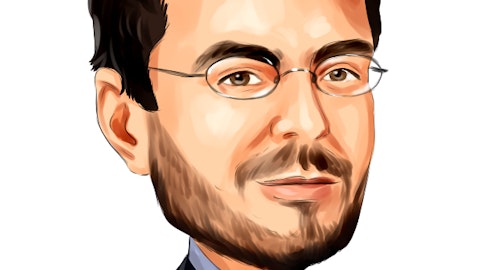Maurizio Fava: Sure. So it’s a great question. I’m Maurizio Fava, the Chief of Psychiatry at Mass General and the principal investigator for the studies. The — one of the characteristics of the monotherapy trial was that patients had to be off medicines. So they had to be typically treatment-naïve, never treated during the current episode. And in addition, they had to be relatively lean for U.S. standards, that is they have to have a BMI between 18 and 30. And we know, for example, that chronic and recurrent depression is associated with weight gain. People end up having BMIs well in the 30s. So I think that the combination of the pandemic causing stress-induced depressive episodes in individuals who did not have a prior history of depression has led to a number of individuals seeking treatment from a study because they were having trouble accessing treatment because they were not in treatment, if you wish, before.
And as we see often, stress-induced and depressive episodes have a high probability of spontaneous remissions. They get better on their own. But if they get better on their own, they get better on placebo as well. In the 301 study, we have patients who have to be on antidepressants, have to have failed to respond to antidepressants. They have to be in treatment with a psychiatrist. And so they are very likely to have recurrent forms of depression, so more bona fide conditions, medical conditions. The challenge is that according to our DSM-5 classification, the person who develops depressive symptoms acutely meets the criteria exactly for a major depressive episode exactly as someone who has had recurrent episode or has chronic symptoms. So when we designed the monotherapy study, we did not factor in the impact of the pandemic on kind of the diagnosis of depression in the general population.
I can tell you as the Chief of Psychiatry in Mass General, we’ve seen a tripling of the referrals for anxiety depression to our department. And we’ve seen nationally in the epidemiological studies that we see the tripling of anxiety and depression. So are these diseases, what we’re seeing is rise of people experiencing depression? Or are these stress-related depressive episodes that in some ways will continue to resolve? The answer — we don’t know the answer, but it clearly affected our monotherapy trial. In my opinion, this should not be the issue in patients who have been under treatment with a psychiatrist not responding to treatment. The chances of spontaneous remissions are very, very small in that population, compared to patients never treated first step is caused by the pandemic.
Sergio?
Sergio Traversa: Thank you, Maurizio — Dr. Fava. And I hope that answers your question. And the second part of the question is the number of patients. The number of patients was a variable up to 350 patients, 360. The DSMB recommended to stop the trial at the minimum number, it was 220. We exceeded a little bit that, and we are exceeding a little bit that. But don’t read anything into that because the data monitoring committee may have made a recommendation for two reasons. The trial, it’s futile. So it’s not worth to proceed and add more patients that they would never be statistically significant or the trial is already statistically significant at the 220 numbers. So I mean what the DSMB recommended, it doesn’t mean anything in terms of results. No way to read if it’s because the trial will be successful or the trial will not be successful. Hope it answers also the second part of your question.
Uy Ear: Yes. Thank you very much. Thanks.
Sergio Traversa: And next, we go to Yatin Suneja of Guggenheim Partners.


